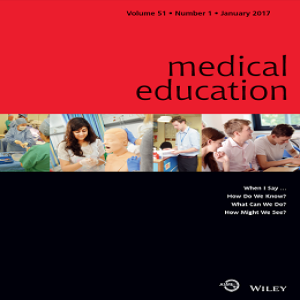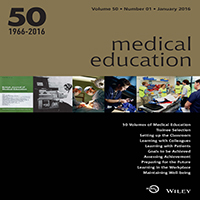Episodes

Wednesday Jul 13, 2022
Wednesday Jul 13, 2022
Hatfield et al. demonstrate that medical students do not reduce preceptor productivity when measured by number of patients seen per half-day, raising questions about healthcare organization financial policy.
Read the accompanying article to this podcast: https://onlinelibrary.wiley.com/doi/full/10.1111/medu.14733

Thursday Jul 07, 2022
Thursday Jul 07, 2022
Stephens et al. demonstrate that clinical medical students experience uncertainty in a wide variety of ways that often differ from the experiences of clinicians with more established knowledge and careers.
Read the accompanying article to this podcast: https://onlinelibrary.wiley.com/doi/full/10.1111/medu.14743

Thursday Jul 07, 2022
Thursday Jul 07, 2022
The authors explore medical student engagement by considering methods of measurement, drivers, and outcomes. Sensitivity and malleability to context appear paramount to better understanding this concept and creating hope for beneficial interventions.
Read the accompanying article to this podcast: https://onlinelibrary.wiley.com/doi/full/10.1111/medu.14799

Thursday Jun 23, 2022
Thursday Jun 23, 2022
By analysing 50,120 medical student evaluations over 15 years, the authors found that the number of failing evaluations is decreasing over time. Senior faculty were more likely to document poor student performance than assistant professors.
Read the accompanying article to this podcast: https://onlinelibrary.wiley.com/doi/10.1111/medu.14725

Thursday Jun 23, 2022
Thursday Jun 23, 2022
Cantillon et al. explore how clinical teaching and learning are uniquely shaped by the specialty-specific cultures of postgraduate training.
Read the accompanying article to this podcast: https://onlinelibrary.wiley.com/doi/full/10.1111/medu.14727

Monday May 30, 2022
Monday May 30, 2022
This paper offers examination of how residency applicants assess fit to the programs at which they interview during the virtual recruitment era, showing that female and minority applicants perceive poorer fit.
Read the accompanying article to this podcast: https://onlinelibrary.wiley.com/doi/full/10.1111/medu.14729

Monday May 30, 2022
Monday May 30, 2022
The authors explored how group alliance, or specialty identity, primes conversations between physicians in moments of conflict, emphasizing the importance of uniting as one team to care for the patient.
Read the accompanying article to this podcast: https://onlinelibrary.wiley.com/doi/full/10.1111/medu.14715

Wednesday May 11, 2022
Wednesday May 11, 2022
In this systematic review, the authors present 5 concepts as a framework for understanding the shared and unique experiences of IMGs worldwide that could, thereby, be used to guide needs assessment and policy.
Read the accompanying article to this podcast: https://onlinelibrary.wiley.com/doi/full/10.1111/medu.14708

Wednesday May 11, 2022
Wednesday May 11, 2022
Quyam and Abumehdi's examination of trainee experiences during the pandemic leads them to suggest incorporating states of impairment into education to maximise opportunities for growth rather than simply trying to 'treat' impairment away.
Read the accompanying article to this podcast: https://onlinelibrary.wiley.com/doi/10.1111/medu.14738

Monday May 09, 2022
Monday May 09, 2022
China's growth in simulation centres is analyzed to reveal three implementation strategies common to high-performance centers: facility management platforms, teaching and training centers, and innovation centers.
Read the accompanying article to this podcast: https://onlinelibrary.wiley.com/doi/abs/10.1111/medu.14741

